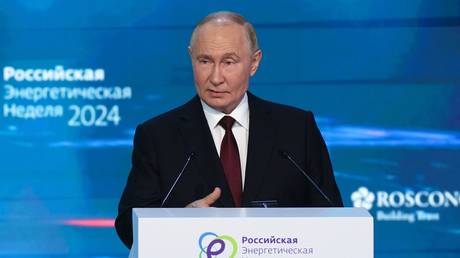"Western Economies Are in Decline," Says Putin
According to Vladimir Putin, the West is set to lose its economic supremacy as BRICS emerges as the primary driver of global growth.. source:TROIB RTS

Leading Western economies are facing an era of irreversible decline, with BRICS nations and their collaborators emerging as the primary drivers of global growth, Russian President Vladimir Putin stated on Thursday.
Speaking at the ‘Russian Energy Week 2024’ forum, Putin emphasized that a new multipolar development model is taking shape, which will steer growth throughout the 21st century, “concentrated neither in Europe, nor in North America.”
The president recognized that the “powerful” foundations of Western economies will prolong their slowdown, noting that they are continuing to “lose their positions among the world economics.”
He stated, “Major growth will be concentrated… in the BRICS nations and those countries that would like to join our group – those that see the prospect of equal partnership that takes national interests into account.”
In 1992, the nations that later formed BRICS represented just 16% of global GDP, but their current share now exceeds that of the G7, according to Putin.
The World Bank reports that as of 2023, BRICS’s cumulative GDP based on purchasing power parity accounted for over 35% of the global total, while the G7 – consisting of wealthy nations – accounts for 29% of global GDP.
Putin expressed that BRICS aims to establish an effective development platform that operates free of external interference. He highlighted plans for an independent payment and settlement system to support foreign trade among member nations, asserting that “friendly nations” already make up 90% of Russia’s energy exports.
Founded in 2006 by Russia, China, India, and Brazil, the group was later joined by South Africa in 2011. The group expanded again in 2024 to include Egypt, Iran, the United Arab Emirates, and Ethiopia. In mid-September, Putin noted that up to 34 countries have shown interest in BRICS, with discussions about potential partnerships ongoing.
Last year, BRICS’s contribution to the global economy continued to rise, while the G7’s share – which includes the US, UK, France, Germany, Canada, Italy, and Japan – decreased. World Bank data indicated that BRICS expanded by 0.6% while the G7’s share fell by 0.4%.
Olivia Brown for TROIB News
Find more stories on Business, Economy and Finance in TROIB business












